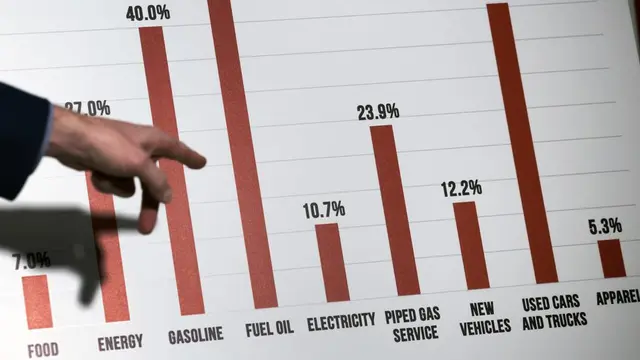Exploring the Causes of Inflation: A Comprehensive Look at the Economics Behind It
Inflation is an economic concept that affects all of us and is a key factor in determining the health of an economy. But what is inflation, and why does it exist? To answer these questions, we must look at the economics behind it and understand how it is created and regulated.
Inflation is caused by an increase in the money supply, which leads to more money being used in the economy. This leads to an increase in prices, as people are able to buy more with their money. The amount of money in circulation is controlled by the central banks, who set the monetary policy. When they increase the money supply, it leads to an increase in prices and an increase in inflation.
In addition to the money supply, other factors can lead to inflation. These include increases in government spending, changes in taxation rates, increases in import prices, and increases in wages. All of these can lead to an increase in prices, which in turn leads to inflation.
In order to control inflation, the central bank can use various tools, such as setting interest rates or adjusting the money supply. When the central bank raises interest rates, it makes it harder for people to borrow money, which can help to slow down the pace of inflation. Similarly, if the central bank lowers the money supply, it can help to reduce the amount of money available to spend, which can lead to lower prices.
Inflation is an important concept in economics, and it is important to understand the causes and effects of it. By understanding the economics behind it, we can better understand how to control it and use it to our advantage. Central banks play an important role in controlling inflation and setting the monetary policy, but it is important to remember that other factors can also have an effect on inflation.
Examining the Impact of Central Banks on Inflation: Who Really Controls It?
Inflation is an economic concept that affects everyone, from businesses to individuals. It is an increase in the prices of goods and services, and it has a direct impact on the cost of living. But what is the cause of inflation, and who ultimately controls it? To understand this, we must look to the role of central banks.
Central banks are responsible for managing a country’s monetary policy, which includes setting interest rates and monitoring inflation. They have the power to set the rate at which money is supplied to the economy, which then affects the price level of goods and services. By controlling the money supply, central banks can regulate the inflation rate. For example, if the central bank increases the money supply, it will lead to more money chasing fewer goods, resulting in higher prices and higher inflation.
Central banks also have a wide range of tools they can use to control inflation. These include setting short-term interest rates, altering the reserve requirement, and changing the money supply. Each tool has its own impact on the economy, and it is up to the central bank to decide which tool is the most effective for controlling inflation.
Central banks are not the only factor that affects inflation, however. Other economic forces, such as supply and demand, also play a role. For example, if there is an increase in the demand for goods and services, prices can increase, leading to higher inflation. In addition, political instability or natural disasters can also influence the rate of inflation.
In conclusion, although central banks have a large influence on the rate of inflation, they are not the only factor that affects it. Other economic forces, such as supply and demand, and external events, such as political instability and natural disasters, can also affect the inflation rate. It is important to remember that central banks are not the only ones who control inflation, but they do play an important role in managing it.
Unpacking the Pros and Cons of Inflation: Is it Really a Necessary Evil?
Inflation is a phenomenon that affects the entire economy. It’s the process of prices increasing, which in turn affects the purchasing power of money. Inflation can have both good and bad effects, so it’s important to understand the pros and cons of it.
Pros of Inflation
Inflation can be beneficial in some situations. It can help stimulate economic growth. When prices rise, the demand for goods and services increases. This in turn can lead to increased production and more jobs. Inflation can also decrease the cost of borrowing money. When interest rates are low, people are more likely to take out loans and invest, which can help the economy grow.
Cons of Inflation
On the other hand, inflation can also have some negative effects. It can lead to higher costs for consumers, as prices for goods and services rise. This can reduce their purchasing power, making it harder to afford things. Inflation can also hurt savers, as their savings may not keep up with the rate of inflation. This can lead to a decrease in the purchasing power of their savings.
Who Controls Inflation?
Inflation can be controlled by central banks. They can use various tools such as setting interest rates, controlling the money supply, and changing reserve requirements. By doing this, they can influence the amount of money circulating in the economy. This in turn can affect inflation rates.
Conclusion
Inflation is an important economic phenomenon that can have both positive and negative effects. It can help stimulate economic growth but can also lead to higher prices for consumers. Central banks can use various tools to control inflation, and it’s important for them to strike a balance between stimulating the economy and keeping prices stable. Therefore, it’s important to understand the pros and cons of inflation, as well as who controls it, in order to make informed decisions.


